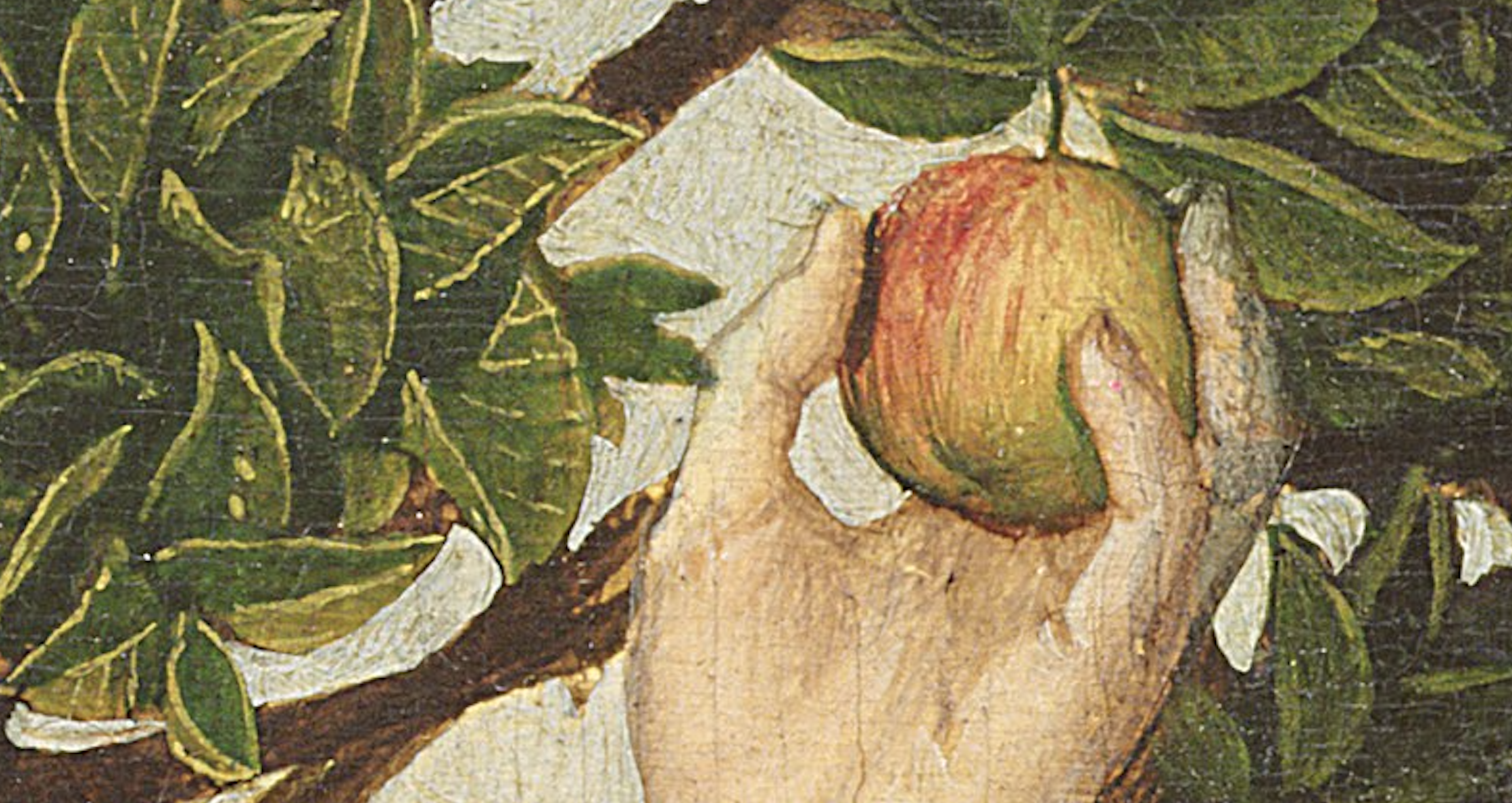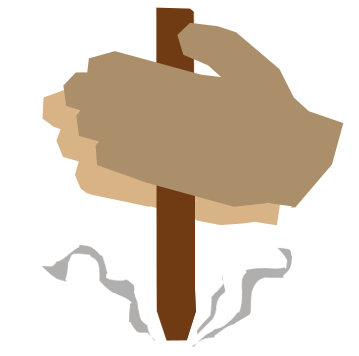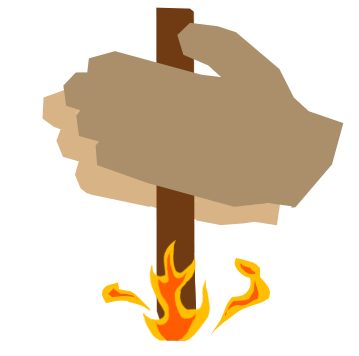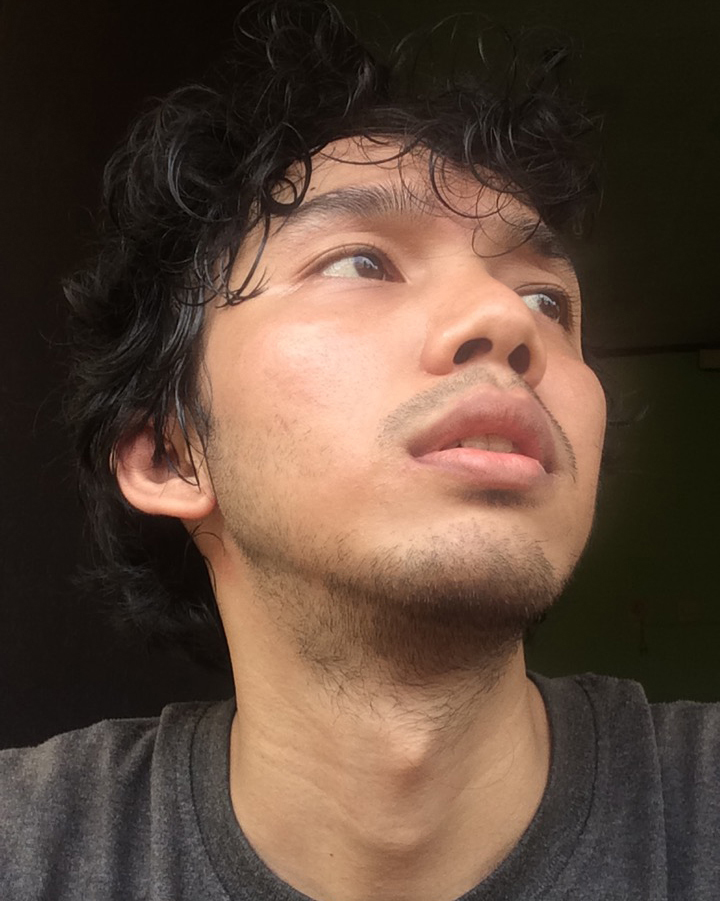In the beginning..

"La Chute" (1479) by Hugo Van der Goes
As a kid, the story of Genesis always fascinated me. I first heard it from my grandmother, "In the beginning.." she said, then repeated by people around with the same enthusiasm that the fruit eaten by Adam and Eve was an actual forbidden fruit, guarded by an evil snake in a place called the Garden of Eden. It gave the impression as if it really existed somewhere up there, beyond the sky, and one day we could visit it during holiday. I found it strange and beautiful as a bedtime story to cover something we didn't have an explanation for. It made me imagine how the fruit might look, how it tasted, and wonder if there could be any other kind of fruit. As I grew up, I buried most of those childhood fairytales, but I chose to spare this one, as a souvenir, to remind me of that innocent time. So, in order to not let it die uncovered, I try to give it a new uniform and see it far from different dimensions.
Sitting by the campfire, I listen to the snake’s voice again. It is old and raspy without temptation; it feels like a call that once told us to discover ancient flame, to unveil something powerful in every breath that obeys the order and laws of number, to kiss the sun and steal the ring of Saturn, to fill the cosmos with our everlasting dreams, until we were lost again in search of ourselves. "Eat the fruit slowly, bit by bit and you will understand," said the snake. Then I fall, flooded with pain and suffering. "Cross that border, go away to a place beyond your intuition, and never give up," the snake repeated. "Who are you?" I asked. "I am, your curiosity".
The Idea
I imagine this blog as a cave which animates primitive ingredients to capture the hunter-gatherer lifestyle, like the excitement of discovering fire, drawing on the walls, looking for constellations of stars, or the joy of sharing stories around the campfire.

Light Mode: Fire making!

Dark Mode: Fired up!
What is this?
This blog is an attempt to project and organize my thoughts; a sort of documentation of past and present memories; a place where I can practice expressing ideas, capture my own inquiry and thinking process, reflect on spontaneous firsthand experiences, tell the story of how I felt towards stuff I've read and heard, what I've discovered and what I'm working on; and to share a sleepless dialogue within.
About Me

I grew up in a sleepy little town in North Sumatra, it's surrounded by the mountains and sea-facing the Indian Ocean. So, the hobbies that you’re likely to develop in a place like that are hiking, swimming, fishing and wondering what lies beyond the sea and the mountain. After high school, I took my first sail to study computer science and mathematics. Later, I began my professional career as a software engineer in Jakarta, mostly write code around C++, Java, JavaScript and TypeScript for work.
In the meantime, I decided to learn French. Then, after the pandemic, I took another voyage and somehow ended up in Southern France. I am currently a master's student at the Université de Toulouse. Here, I find myself drowning in the rigorous study of theorems and formal proofs in mathematics. I have many interests that I still regularly do to this day: I enjoy cycling, climbing, reading, juggling trick, chess, guitar/piano, drawing, capturing moments, meditating, and searching for nature in spare time.
Travel
I made this visual map to keep track of the countries I've been so far. I hope to explore more places I haven't yet seen in the future.
Asia (7): 🇮🇩, 🇹🇱, 🇸🇬, 🇲🇾, 🇹🇭, 🇯🇵, 🇨🇳
Europe (3): 🇫🇷, 🇪🇸, 🇮🇹
Languages
( ! ) I will move this section to a separate page soon.
As a child, there was a moment when I didn't quite understand why my parents spoke in different local languages with their families, but used Bahasa with each other. I thought they had their own secret language. Growing up, I took all of the diversity for granted and never made any further effort to learn them. I went to different schools and learned various extra languages. Below are the languages I've learned so far:
1. Bahasa Indonesia
My native language. I learned the theoretical aspect from elementary to high school. It's a phonetic language (pronounced as it is written) like Spanish or Italian, with simple grammar and without gendered nouns. The language has a lot of loanwords from Dutch, Portuguese, Sanskrit, Arabic, and Mandarin. Bahasa Indonesia is quite similar to Malay, so if you know Bahasa, or vice versa, you can quickly understand the other. If you're interested to learn the language, using Duolingo, or GPT (with precaution) is a good start to grasp the basic idea. While I don't have any good theoretical resources to share, I can recommend books or movies to give a sense of the culture; feel free to ask me. For now, I will put here the list of popular Indonesian literature that you might find interesting (Goodreads). If you're familiar with spaced repetition (SRS) app like Anki, you can find Indonesian shared decks here (Anki Decks). Once you're committed, consider finding a professional or community tutor through platforms like Italki.
2. English
Advanced (B2 - C1 level). The origin started around the age of 9 because of an RPG game, "Final Fantasy VIII". I had to look up a thick dictionary every time the dialogues popped up and write them down on a piece of paper. Back then, it's almost impossible to find a game in Bahasa. The same habit continued with mostly video games and songs, but I never watched films with English subtitles because I hated rewinding them every time. For the most part, I learned it from regular English classes in school. Up until the end of high school, except for articles, I never really read any literature in English. The first book that I fully read in English was a very thin "Sherlock Holmes: Scandal in Bohemia" that I borrowed from the university library. Along the way I increased the difficulty by reading more challenging books, but I still struggled with my speaking articulation since I rarely practiced it, not until I started working in an international work environment where I interacted with colleagues from different countries. In an attempt to improve, I practiced monologues and used an association technique to describe lists of pictures within a time limit. I'm still maintaining English to this day, and there are still so many interesting things that I pick up when I read or hear something. Takeaways: To study grammar I strongly recommend this book: "Understanding and Using English Grammar" by Betty S. Azar. It contains plenty of exercises and good grammatical ideas that you can easily digest. For the other aspects, I put in the footnotes, as I use similar ways to study other languages.
3. Mandarin
Very Basic. During junior high school, I attended a Buddhist-based school and learned Mandarin for 3 years. I didn't maintain it and almost completely forgot everything, though I still remember some characters, numbers, and phrases. For me, apart from the tricky aspects like tones and characters, the hardest part was finding the motivation to learn, it feels too dry and I didn't feel like their pop cultures hold me like the way Japanese or French does. But who knows, it was a long time ago, maybe I'll return someday if I have the time.
4. German
Basic (A1 level). I attended public senior high school and learned German for 2 years. If I had to pick one of my favorite classes throughout my school years, it would be German. Not because it's easy, German is still impossible, too many arbitrary and complex grammar rules, but Frau Suzana made the whole experience really unforgettable. It was not just a language class, but also psychology. The enthusiasm and open-mindedness, that's the quality that inspires me more from a teacher. She made us sing, dance, and cry in the class. She made everyone from the shyest to the most rebellious students express their feelings towards each other and reconcile differences. Back to the language, after high school I didn't maintain it for many years, until about pandemic era, I decided to keep in touch with German via Duolingo and Youtube channel like Easy German. Since I have a few German friends, sometimes it's fun to try to figure out what they're talking about with my limited vocabulary.
5. French
Intermediate (B2). Learning this language has been more like a self-discovery for me. The motivation I mentioned earlier, I found it in French through a series of events. It began to take shape in junior high school when I first read the story about Fermat's Last Theorem in a Japanese manga. During high school, I read Albert Camus's The Stranger. In university, I watched many French movies and read more books by French writers during the pandemic. When I opened my science and math textbooks, they were filled with French names (Pascal, Laplace, Fourier, Lagrange, Cauchy, Descartes, Fermat and, so on). I even used Laplacian and Fourier transform in my thesis. All of these are potential catalysts, but the final triggers happened when there were 2 visiting professors from France in our lab, and my advisor asked me to assist them during their stay.
Later, after I had started working, I came across a blog article by Eka Kurniawan (an Indonesian author) that talked about his effort to read Marcel Proust's In Search of Lost Time in the original French À la recherche du temps perdu. "There was a feeling I can't describe when I read him in his own language," said Eka. That day, I determined to learn French. "I'm going to read Camus in his own language" I said to myself. Since France is not fully a phonetic language, I thought it would be better to learn the pronunciation from a tutor right from the start rather than doubling my effort to fix it later. So, I took a French course every Saturday at one of the French institutes in Jakarta. Later, when I reached DELF A2, it was just at the beginning of the pandemic. I returned to my hometown and learned the rest of the level by myself. I spent about a week gathering reliable resources, methods and building my own framework.
For grammar, I use Easy French Step-by-Step by Myrna Bell, It is like Betty Azar's book, but for French, and Advanced French Grammar by Monique L'Huiller. For vocabulary, I created my own lists from the books mentioned above, The First 1000 words in French (I liked the visualization in this book), and words I encountered from various media as day to day practice. I compiled them both in Memrise and Anki, because Memrise have some interractive features (later I completely migrated everything to Anki, after Memrise stopped supporting community features).
Other Languages
I have a few other languages I'm interested in learning, like Greek, Italian, Russian, and Japanese. Perhaps later, once I'm proficient in French. I don't want to chase too many rabbits and end up catching none, as every skill comes with a cost to maintain.
Notes:
Resources are abundant out there; people say many things. Most of them are good if you can implement, but some are harder to follow, so we have to adapt them to our needs. For my part, these have been quite effective habits, and I have faithfully followed them until now:- 1. I strongly encourage everyone to build their own SRS vocabulary with context (start simple, bit by bit so you don't feel overwhelmed); you can find some of the good examples in Anki's shared decks. [ * ]
- 2. Don't just review, try to recall as much as possible, and don't add more study if you can't recall 90% of the previous study.
- 3. To practice speaking, prepare a list of pictures and describe them for 3-5 minutes without stopping, as if talking to someone. If a picture is difficult to describe, associate it with something familiar. If you're stuck on a word (but know how to say it in your native language), write it down and look it up later, then explain why it's hard to describe. Listen to your recording, and notice the words that you find hard to pronounce, and refine it (you can check on Forvo or Google translate).
- 4. To practice listening, podcast is a great start (find a topic that interests you and listen it MANY TIMES). I also often watch stand-up comedy (e.g.Paul Mirabel or Sebastian Marx, as they often deliver memorable punchlines and cultural references. And, don't forget about music, scrutinize the lyrics.
- 5. Write a short diary about your day, invest on it consistenly.
Reading and writing cannot be separated, reading is breathing in and writing is breathing out – The Language Nerd
- [*] I will update soon for some other resources that I forget to mention here.
Gadgetery
Laptop : Macbook Pro M3 Pro 2023, 14"
Phone : iPhone 5 (retired), iPhone 7 (retired), iPhone 13
eReading: Kindle Paperwhite 2020
Earbuds : Senheiser CX True (broken), Nothing Ear (return), Bose QC Earbuds II
Camera : Canon EOS 600D
Lens : Canon EF 75-300mm f/4-5.6 III (sold)
Game Console : Nintendo Switch Lite (Zacian Zamazenta) 2019
Note for programmer
This blog is built mainly using GatsbyJS and GraphQL, hosted on Netlify, and I've put the code on Github under Creative Common BY-NC 4.0 License. Feel free to clone, use, and modify it for non-commercial purposes. If you have any questions or suggestion, don't hesitate to reach me out.
Credit
Title font :
- Fira Sans-serif by Erik Spiekermann
- 29LT Ada by Toshi Omagari
Mini-screen background: Moonlit Night 1878 by Ivan Aivazovsky
